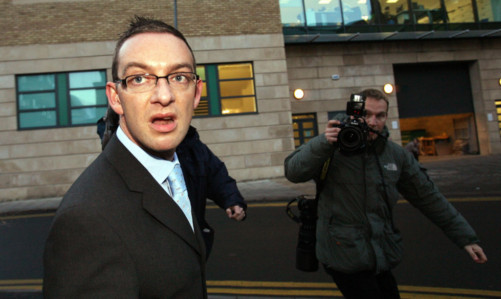A Dundee-trained nurse branded an “angel of death” after being convicted of murdering four elderly female patients may be given a fresh chance to clear his name.
The Criminal Cases Review Commission (CCRC) has opened a full investigation into the conviction of Colin Norris (36), who was described as “another Harold Shipman in the making” after being jailed for 30 years for the murder of four women and the attempted murder of another while working at Leeds General Infirmary and St James’ Hospital in the same city.
The CCRC can refer a case back to the Court of Appeal if it believes new evidence casts doubt on a conviction and a miscarriage of justice has occurred.
Norris, who is originally from Glasgow and studied nursing at Dundee University, was jailed in 2008.
It was claimed he injected all five of his victims with massive doses of insulin, the drug used to treat diabetes.
This can cause hypoglycaemia, a potentially fatal condition caused by blood sugar levels falling dangerously low.
Although there was no direct evidence linking him to the killings, he was on duty each time when the five women suffered their hypoglycemic episodes in Leeds in 2002.
The prosecution successfully argued that such a cluster of death would not happen naturally.
However, scientific studies have since revealed that naturally occurring cases of hypoglycaemia are more common among elderly people than first thought and that between 5% and 10% of frail, elderly patients suffer such episodes.
A study published this year by journal European Geriatric Medicine even claimed patients who suffer spontaneous hypoglycaemic episodes in hospital are most likely to suffer adverse outcomes.
Last year, one of the world’s leading experts on insulin poisoning, Professor Vincent Marks, said he believed Norris’ conviction was unsafe.
He claimed there was no evidence of insulin poisoning and that all of the five women had risk factors that may have led to “spontaneous hypogylcaemia” such as emaciation, starvation, infection as well as cardiac or renal failure. He has also given a statement to Norris’ defence team.
It also emerged that several other cases of hypoglycaemia had occurred in the hospital where Norris had worked but he had not been on shift at the time. Norris applied to the CCRC on October 10 last year to have his case reviewed.
Although they began examining his case in June this year, it may still be months before they decide whether to refer his case back to the Court of Appeal.
Norris’s original appeal was rejected in 2009. Lord Justice Aikens, sitting with two other judges, ruled Norris’ original conviction was “safe” and that the case against the nurse was ”very strong indeed.”
Norris began studying for his Higher Diploma at Dundee University in September 1998. He completed his diploma and registered as a nurse three years later.
